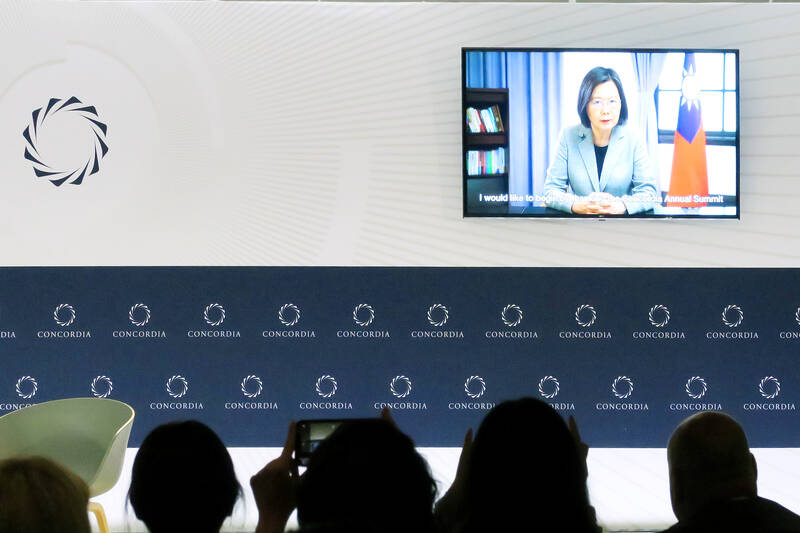Securing Taiwan’s democracy is imperative to ensuring freedom and human rights, President Tsai Ing-wen (蔡英文) told the Concordia Summit in a prerecorded video on Monday.
Tsai was asked by the nonprofit organization Concordia to address the summit, which takes place on the sidelines of the annual UN General Assembly in New York City.
Tsai said the summit is taking place at a consequential time, as democracies and the rules-based international order are being challenged by the COVID-19 pandemic, and attempts by authoritarian regimes to corrode democratic institutions and tarnish human rights and civic space.

Photo: CNA
“At this moment, democracies and the rules-based world order are facing the greatest challenges since the Cold War,” she said.
Tsai touted Taiwan’s role in donating masks and medical equipment to other countries at the beginning of the pandemic, while also sharing information about the virus, despite not being a member of the UN.
“With the inclusion of Taiwan in the UN system, I am confident that we can work even more closely to face future challenges and safeguard the rules-based international order,” she said.
Securing Taiwan’s democracy is imperative in securing freedom and human rights for the world’s collective future, Tsai said, adding that Taiwan should bolster its partnerships with international bodies such as the G7 and ASEAN, as well as maintain strong relations with its diplomatic allies.
“By working together, we are resisting what authoritarian regimes do best — divide and conquer — and foiling their expansionist goals,” she said.
“By standing united in our shared values and beliefs, I am confident that we can achieve what we set out to accomplish,” she added.
Separately yesterday, Tsai attended the opening of an annual cybersecurity show in Taipei to tout her government’s efforts to build a comprehensive information security defense system.
The theme of Cybersec 2022 — “Digital Transformation, Cybersecurity Upgrades” — matches the government’s direction in developing digital policies, Tsai told the event at the Taipei Nangang Exhibition Center.
The Ministry of Digital Affairs was established last month, while the National Institute of Cyber Security is to begin operations at the end of this year, Tsai said.
The government is accelerating its efforts to build a comprehensive joint system for cybersecurity protection, she added.
To that end, the Financial Supervisory Commission has revised regulations to encourage listed companies in Taiwan to establish a dedicated cybersecurity unit and appoint a chief cybersecurity officer, she said.
By the end of this year, 113 listed companies are expected have such a unit in place, she added.
Meanwhile, 80 high-tech firms have joined the Taiwan Cyber Security Alliance, a group that facilitates the exchange of cybersecurity information, she said.
Taiwan has also established SEMI E187, a specification for fab equipment, to boost semiconductor information security, she added.

DAREDEVIL: Honnold said it had always been a dream of his to climb Taipei 101, while a Netflix producer said the skyscraper was ‘a real icon of this country’ US climber Alex Honnold yesterday took on Taiwan’s tallest building, becoming the first person to scale Taipei 101 without a rope, harness or safety net. Hundreds of spectators gathered at the base of the 101-story skyscraper to watch Honnold, 40, embark on his daredevil feat, which was also broadcast live on Netflix. Dressed in a red T-shirt and yellow custom-made climbing shoes, Honnold swiftly moved up the southeast face of the glass and steel building. At one point, he stepped onto a platform midway up to wave down at fans and onlookers who were taking photos. People watching from inside

A Vietnamese migrant worker yesterday won NT$12 million (US$379,627) on a Lunar New Year scratch card in Kaohsiung as part of Taiwan Lottery Co’s (台灣彩券) “NT$12 Million Grand Fortune” (1200萬大吉利) game. The man was the first top-prize winner of the new game launched on Jan. 6 to mark the Lunar New Year. Three Vietnamese migrant workers visited a Taiwan Lottery shop on Xinyue Street in Kaohsiung’s Gangshan District (崗山), a store representative said. The player bought multiple tickets and, after winning nothing, held the final lottery ticket in one hand and rubbed the store’s statue of the Maitreya Buddha’s belly with the other,

Japan’s strategic alliance with the US would collapse if Tokyo were to turn away from a conflict in Taiwan, Japanese Prime Minister Sanae Takaichi said yesterday, but distanced herself from previous comments that suggested a possible military response in such an event. Takaichi expressed her latest views on a nationally broadcast TV program late on Monday, where an opposition party leader criticized her for igniting tensions with China with the earlier remarks. Ties between Japan and China have sunk to the worst level in years after Takaichi said in November that a hypothetical Chinese attack on Taiwan could bring about a Japanese

‘COMMITTED TO DETERRENCE’: Washington would stand by its allies, but it can only help as much as countries help themselves, Raymond Greene said The US is committed to deterrence in the first island chain, but it should not bear the burden alone, as “freedom is not free,” American Institute in Taiwan Director Raymond Greene said in a speech at the Institute for National Defense and Security Research’s “Strengthening Resilience: Defense as the Engine of Development” seminar in Taipei yesterday. In the speech, titled “Investing Together and a Secure and Prosperous Future,” Greene highlighted the contributions of US President Donald Trump’s administration to Taiwan’s defense efforts, including the establishment of supply chains for drones and autonomous systems, offers of security assistance and the expansion of